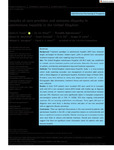Inequity of care provision and outcome disparity in autoimmune hepatitis in the United Kingdom
| dc.contributor.author | Dyson, JK | |
| dc.contributor.author | Wong, LL | |
| dc.contributor.author | Bigirumurame, T | |
| dc.contributor.author | Hirschfield, GM | |
| dc.contributor.author | Kendrick, S | |
| dc.contributor.author | Oo, YH | |
| dc.contributor.author | Lohse, AW | |
| dc.contributor.author | Heneghan, MA | |
| dc.contributor.author | Jones, DEJ | |
| dc.date.accessioned | 2022-01-20T12:36:24Z | |
| dc.date.issued | 2018-11 | |
| dc.identifier.issn | 0269-2813 | |
| dc.identifier.issn | 1365-2036 | |
| dc.identifier.uri | http://hdl.handle.net/10026.1/18591 | |
| dc.description.abstract |
<jats:title>Summary</jats:title><jats:sec><jats:title>Background</jats:title><jats:p>Treatment paradigms in autoimmune hepatitis (<jats:styled-content style="fixed-case">AIH</jats:styled-content>) have remained largely unchanged for decades. Studies report ≤20% of patients have sub‐optimal treatment response with most requiring long‐term therapy.</jats:p></jats:sec><jats:sec><jats:title>Aim</jats:title><jats:p>The United Kingdom Autoimmune Hepatitis (<jats:styled-content style="fixed-case">UK</jats:styled-content>‐<jats:styled-content style="fixed-case">AIH</jats:styled-content>) study was established to evaluate current treatment practice and outcomes, determine the unmet needs of patients, and develop and implement improved treatment approaches.</jats:p></jats:sec><jats:sec><jats:title>Methods</jats:title><jats:p>The United Kingdom Autoimmune Hepatitis study is a cross‐sectional cohort study examining secondary care management of prevalent adult patients with a clinical diagnosis of autoimmune hepatitis. Enrolment began in March 2014. Prevalent cases were defined as having been diagnosed and treated for >1 year. Demographic data, biochemistry, treatment history and response, and care location were collected.</jats:p></jats:sec><jats:sec><jats:title>Results</jats:title><jats:p>In total, 1249 patients were recruited; 635 were cared for in transplant units and 614 in non‐transplant centres (81% female with median age at diagnosis 50 years). Overall, 29 treatment regimens were reported and biochemical remission rate was 59%. Remission rates were significantly higher in transplant compared to non‐transplant centres (62 vs 55%, <jats:italic>P</jats:italic> = 0.028). 55% have ongoing corticosteroid exposure; 9% are receiving prednisolone monotherapy. Those aged ≤20 years at diagnosis were more likely to develop cirrhosis and place of care was associated with an aggressive disease phenotype.</jats:p></jats:sec><jats:sec><jats:title>Conclusions</jats:title><jats:p>There are significant discrepancies in the care received by patients with autoimmune hepatitis in the UK. A high proportion remains on corticosteroids and there is significant treatment variability. Patients receiving care in transplant centres were more likely to achieve and maintain remission. Overall poor remission rates suggest that there are significant unmet therapeutic needs for patients with autoimmune hepatitis.</jats:p></jats:sec> | |
| dc.format.extent | 951-960 | |
| dc.format.medium | Print-Electronic | |
| dc.language | en | |
| dc.language.iso | en | |
| dc.publisher | Wiley | |
| dc.subject | Adolescent | |
| dc.subject | Adrenal Cortex Hormones | |
| dc.subject | Adult | |
| dc.subject | Aged | |
| dc.subject | Aged, 80 and over | |
| dc.subject | Cohort Studies | |
| dc.subject | Cross-Sectional Studies | |
| dc.subject | Female | |
| dc.subject | Healthcare Disparities | |
| dc.subject | Hepatitis, Autoimmune | |
| dc.subject | Humans | |
| dc.subject | Liver Cirrhosis | |
| dc.subject | Male | |
| dc.subject | Middle Aged | |
| dc.subject | Prednisolone | |
| dc.subject | Treatment Outcome | |
| dc.subject | United Kingdom | |
| dc.subject | Young Adult | |
| dc.title | Inequity of care provision and outcome disparity in autoimmune hepatitis in the United Kingdom | |
| dc.type | journal-article | |
| dc.type | Journal Article | |
| dc.type | Multicenter Study | |
| dc.type | Research Support, Non-U.S. Gov't | |
| plymouth.author-url | https://www.ncbi.nlm.nih.gov/pubmed/30226274 | |
| plymouth.issue | 9 | |
| plymouth.volume | 48 | |
| plymouth.publication-status | Published | |
| plymouth.journal | Alimentary Pharmacology and Therapeutics | |
| dc.identifier.doi | 10.1111/apt.14968 | |
| plymouth.organisational-group | /Plymouth | |
| plymouth.organisational-group | /Plymouth/Faculty of Health | |
| plymouth.organisational-group | /Plymouth/Faculty of Health/Peninsula Medical School | |
| plymouth.organisational-group | /Plymouth/REF 2021 Researchers by UoA | |
| plymouth.organisational-group | /Plymouth/REF 2021 Researchers by UoA/UoA01 Clinical Medicine | |
| plymouth.organisational-group | /Plymouth/Research Groups | |
| plymouth.organisational-group | /Plymouth/Research Groups/Institute of Translational and Stratified Medicine (ITSMED) | |
| plymouth.organisational-group | /Plymouth/Research Groups/Institute of Translational and Stratified Medicine (ITSMED)/CBR | |
| plymouth.organisational-group | /Plymouth/Users by role | |
| plymouth.organisational-group | /Plymouth/Users by role/Academics | |
| dc.publisher.place | England | |
| dcterms.dateAccepted | 2018-08-08 | |
| dc.rights.embargodate | 2022-1-21 | |
| dc.identifier.eissn | 1365-2036 | |
| dc.rights.embargoperiod | Not known | |
| rioxxterms.versionofrecord | 10.1111/apt.14968 | |
| rioxxterms.licenseref.uri | http://www.rioxx.net/licenses/all-rights-reserved | |
| rioxxterms.licenseref.startdate | 2018-11 | |
| rioxxterms.type | Journal Article/Review |


